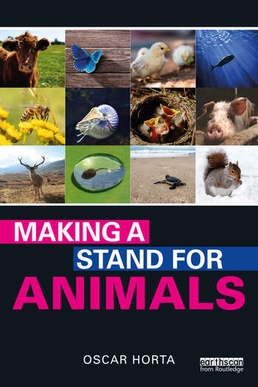Making a Stand for Animals
Making a Stand for Animals is a movement and philosophy dedicated to the protection and welfare of animals. This movement encompasses a wide range of activities, including animal rights, animal welfare, animal rescue, and animal advocacy. The goal is to ensure that animals are treated with respect and compassion, and that their well-being is prioritized in human activities.
History[edit | edit source]
The origins of the animal rights movement can be traced back to the 19th century with the formation of organizations such as the Royal Society for the Prevention of Cruelty to Animals (RSPCA) in 1824. The movement gained significant momentum in the 20th century with the publication of influential works like Peter Singer's Animal Liberation in 1975, which argued for the ethical consideration of animals.
Key Principles[edit | edit source]
The movement is built on several key principles:
- Animal Rights: The belief that animals have intrinsic rights similar to human rights.
- Animal Welfare: The focus on ensuring that animals are treated humanely and their needs are met.
- Veganism: A lifestyle choice that avoids the use of animal products.
- Conservation: Efforts to protect endangered species and their habitats.
Activities[edit | edit source]
Advocacy[edit | edit source]
Animal advocacy involves raising awareness about animal issues and lobbying for legislative changes. Organizations like PETA (People for the Ethical Treatment of Animals) and the Humane Society of the United States (HSUS) are prominent in this area.
Rescue and Rehabilitation[edit | edit source]
Animal rescue groups work to save animals from abusive situations, provide medical care, and find them new homes. Rehabilitation efforts often focus on injured wildlife, with the goal of releasing them back into their natural habitats.
Education[edit | edit source]
Educational programs aim to inform the public about the importance of animal welfare and how they can contribute to the cause. This includes school programs, public campaigns, and community events.
Challenges[edit | edit source]
The movement faces several challenges, including:
- Factory Farming: The industrialized production of livestock poses significant ethical and environmental issues.
- Animal Testing: The use of animals in scientific research remains a contentious issue.
- Habitat Destruction: Human activities that lead to the loss of natural habitats threaten many species.
Related Pages[edit | edit source]
- Animal Rights
- Animal Welfare
- Veganism
- Conservation
- PETA
- Humane Society of the United States
- Factory Farming
- Animal Testing
- Habitat Destruction
See Also[edit | edit source]
- Ethics of Eating Meat
- Wildlife Conservation
- Endangered Species
- Animal Cruelty
- Animal Liberation (book)
Search WikiMD
Ad.Tired of being Overweight? Try W8MD's NYC physician weight loss.
Semaglutide (Ozempic / Wegovy and Tirzepatide (Mounjaro / Zepbound) available. Call 718 946 5500.
Advertise on WikiMD
|
WikiMD's Wellness Encyclopedia |
| Let Food Be Thy Medicine Medicine Thy Food - Hippocrates |
Translate this page: - East Asian
中文,
日本,
한국어,
South Asian
हिन्दी,
தமிழ்,
తెలుగు,
Urdu,
ಕನ್ನಡ,
Southeast Asian
Indonesian,
Vietnamese,
Thai,
မြန်မာဘာသာ,
বাংলা
European
español,
Deutsch,
français,
Greek,
português do Brasil,
polski,
română,
русский,
Nederlands,
norsk,
svenska,
suomi,
Italian
Middle Eastern & African
عربى,
Turkish,
Persian,
Hebrew,
Afrikaans,
isiZulu,
Kiswahili,
Other
Bulgarian,
Hungarian,
Czech,
Swedish,
മലയാളം,
मराठी,
ਪੰਜਾਬੀ,
ગુજરાતી,
Portuguese,
Ukrainian
Medical Disclaimer: WikiMD is not a substitute for professional medical advice. The information on WikiMD is provided as an information resource only, may be incorrect, outdated or misleading, and is not to be used or relied on for any diagnostic or treatment purposes. Please consult your health care provider before making any healthcare decisions or for guidance about a specific medical condition. WikiMD expressly disclaims responsibility, and shall have no liability, for any damages, loss, injury, or liability whatsoever suffered as a result of your reliance on the information contained in this site. By visiting this site you agree to the foregoing terms and conditions, which may from time to time be changed or supplemented by WikiMD. If you do not agree to the foregoing terms and conditions, you should not enter or use this site. See full disclaimer.
Credits:Most images are courtesy of Wikimedia commons, and templates, categories Wikipedia, licensed under CC BY SA or similar.
Contributors: Prab R. Tumpati, MD

